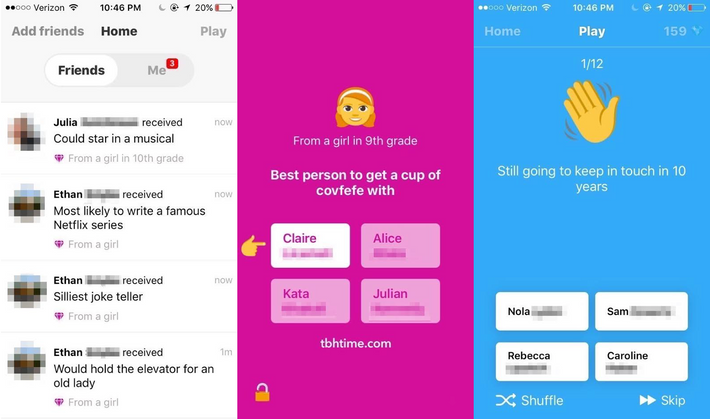![]()
Claire knows what her classmates think of her. A boy in the ninth grade at her high school in Massachusetts thinks she’s “so crafty she could build a house.” Another female classmate says she “looks like a snack.” A different guy describes Claire as “always fiending on that boba.” (Teens, man.) Claire’s got screenshots to prove these compliments — she just doesn’t know who any of them are from.
Welcome to TBH, short for “to be honest,” the latest anonymous-gossip app to emerge overnight as every teenager’s favorite app. “Last Sunday was the first time I heard of it,” Luci, a junior from Texas told Select All about the app’s sudden rise. “It got really popular overnight; it was weird! Almost everyone I know uses it now.” It’s currently the No. 1 free download in the Apple App Store — no small feat, considering TBH is only available in a limited number of states. And its secret is … kindness?
Like Sarahah, the megapopular anonymous-comment app that took over adolescents’ phones earlier this year, TBH allows users — mostly teenagers and young adults — to comment anonymously about their friends and peers. But unlike Sarahah or other infamous anonymous-comment apps (remember Yik Yak?), TBH is not a cesspit of toxic gossip and petty cruelty. In fact, it’s downright nice: The app only allows its users to say positive things about other users, a limitation that, believe it or not, only seems to make the app more popular.
The way the app works is simple: “You sign in with your first and last name. You select your school, gender, and grade. They have questions like ‘always nice to talk to’ and ‘going to win an Academy Award,’ and other nice things,” Claire explained. “You have four options [names of friends and classmates], and you click on one. When you are picked, it’s anonymous. You have no idea who picked you.” The questions — think 2017’s version of yearbook superlatives — are generated both by the TBH team and submitted from users.
TBH first launched at a single high school in Georgia in August, where 40 percent of the student body downloaded the app on the first day. The next day, they expanded the app to three more schools in the area to the same results. “Basically, every iPhone owner at the school downloaded it,” said a TBH spokesperson, who asked not to be named. (TBH is currently not available on Android.) Since then, the app has been released in nine states: Florida, Washington, Rhode Island, Texas, Connecticut, Georgia, Indiana, Massachusetts, and California. (It’s also currently available in New York City as a test, but the app is working toward a statewide release very soon.) “I think at this point, over 25 percent of students in California have the app installed,” the spokesperson said, noting that the app has 2 million daily active users across the United States. “It seems to be the new rage … for now,” said Sharleen, a California senior.

TBH’s overnight success isn’t unfamiliar. Again, earlier this summer, Sarahah (the name loosely translates to honesty in Arabic) spread like crazy among teenagers. But unlike TBH, Sarahah was a free-for-all. Users could anonymously leave comments of any nature — which in practice means comments that are either “really nice or really mean,” as one 17-year-old user told me at the time. Female users in particular were targeted with bullying and overly sexual comments.
TBH is striving to be the anti-Sarahah. It’s heavily moderated to avoid harassment, and while I hesitate to call any app “woke,” TBH is definitely in that neighborhood. Superlatives submitted by users are vetted by the TBH team, which receives about 10,000 submissions per day. One percent of those make it to the app. “Sometimes they’re funny; sometimes they’re catty,” Luci said of the prompts, though the cattiness is always winking — the worst Luci could come up with was, “Always wins their drama,” a far cry from the cruelties of most anonymous comments.
“Anytime we get a complaint about a question, we remove it right away,” the spokesperson said. “We usually don’t deliberate too much; if it upsets someone, it’s gone.” The app offers a nonbinary option for users who don’t want to identify as a “boy” or “girl.” “I guess you could say it assumes everyone is bisexual,” Luci told me, when explaining that all prompts, including the flirty ones, are accompanied by mixed gender user choices.
Like Sarahah, part of using TBH takes place off of the app itself. Teens will screenshot the superlatives they receive — these are also visible to their friends on the TBH app in a News Feed — and upload them to their Snapchat or Instagram stories. “Part of the fun of anonymous apps is trying to get people to admit that it was them,” Luci explained, adding that nobody ever actually fesses up. “I posted one on my Snapchat because the question was, ‘Waiting for our first date,’ and I was like, ‘Reveal yourself, I’m waiting too.’”
Another reason users need a secondary app is because TBH currently has no way for users to communicate with each other. Which means they can’t discuss who received what TBHs, or speculate who sent them, from within the app. The lack of communication options definitely helps with the whole no-bullying thing, but isn’t super conducive to building a social platform. “We definitely will hint that something related to messaging is around the corner, but we won’t say anything more about what it is,” TBH told Select All.
The app is going to need some new features if TBH expects to maintain its status as the hottest thing in teen tech. Anonymous-compliment Facebook pages and apps, like Brighten, have come and gone, and though they’re nice while they last, users often lose interest. For better or worse, the lure of anonymous apps is the drama, and the potential for harassment that comes with said drama.
“It’s a temporary-use app like Pokémon Go or Ask.fm,” Madison, a junior, told me when I asked if she thought her friends would keep using TBH. “It’s not like Instagram or Snapchat or Twitter.” It’s worth noting that both Pokémon Go and Ask.fm are both actually still kicking, they’ve just lost their hype. “At the end of the day, everyone reverts back to their Snapchats, Twitters, and the few that are still really into Instagram,” Luci said. “These apps last around a week or two before someone finds an even more obscure, new form of social media.”



